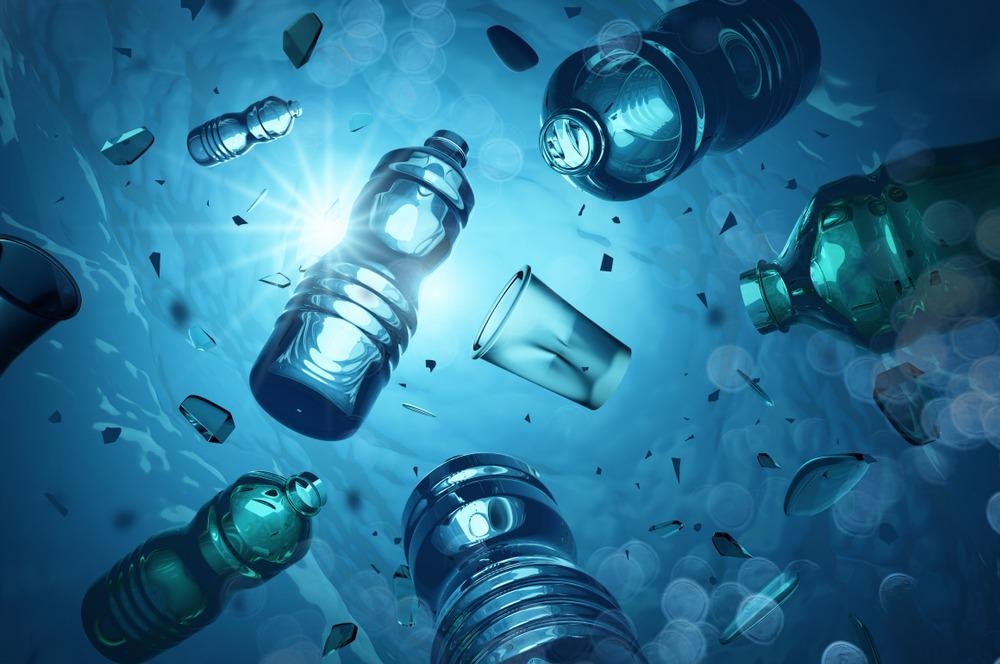Plastic pollution is a growing threat to marine ecosystems which requires innovative solutions to address. A paper currently in the pre-proof stage in the Journal of Environmental Chemical Engineering has presented research into the biodegradation of plastic waste using marine bacteria.

Study: Marine bacterial based enzymatic degradation of low-density polyethylene (LDPE) plastic. Image Credit: solarseven/Shutterstock.com
Plastic: A Useful but Environmentally Damaging Product
Plastic has become ubiquitous with modern society, being widely used for both domestic and industrial purposes. Eminently useful due to its attractive properties such as thermostability, lightweight, flexibility, superior insulation, and low cost, plastic use has nevertheless become a growing problem in terms of environmental damage. Increased demand for plastic products has led to the generation of vast amounts of plastics, with the world producing 359 million tons in 2018.
Plastics are primarily derived from virgin hydrocarbon resources which are non-renewable. Producing plastic causes enormous amounts of climate-change driving greenhouse gases, and products can take centuries to degrade in the environment. Improper waste management has led to the proliferation of plastics in the environment, with most single-use plastic products being sent to landfills or entering the oceans, where it causes pollution and damage to vital, fragile ecosystems.
Once in marine ecosystems, plastic products are broken down via mechanical, physical, chemical, photoreactive, and microbial action into microplastics, where they can enter the food chain via ingestion by marine species. Moreover, plastic waste can lead to the proliferation of harmful bacterial species in both marine ecosystems and on the land. Land use for disposal is another concern.
Plastic pollution does not only causes environmental damage; social and health problems can occur in communities in developing countries forced to live alongside growing mountains of plastic waste, sometimes shipped from more developed nations which lack the infrastructure for plastic recycling. Currently, only 9% of all plastic produced is recycled worldwide, with around 60% sent to landfills. With the vast amounts of waste already in the environment, research has turned to innovative methods for remediating and mitigating this growing ecological threat.
Biodegradation
Biodegradation is a remediation strategy that has been gaining attention amongst environmental scientists in recent years. Microbes are used to degrade plastics under optimal conditions, using enzymes to digest both natural and synthetic polymers into their constituent components. Studies have demonstrated that there are no harmful environmental side-effects of this process. Biomass generated by this method can be used to create value-added secondary products such as biofuels.
Numerous microbial species of algae, fungi, bacteria, and actinomycetes have been explored for use in biodegradation processes. Amongst these, many bacterial species have demonstrated superior degradation activity against harmful plastics such as polyvinyl chloride, LDPE, and HDPE. Different extracellular enzymes are used by microorganisms during the metabolism of polymers including lipase, depolymerase, and esterase. The metabolism of plastics by these enzymes is a two-step process, using carbon as an energy source.
The Study
The study currently in the pre-proof stages before publication in the Journal of Environmental Chemical Engineering has explored the use of three isolates of marine bacterial species for the biodegradation of low-density polyethylene, one B. subtilis isolates (H-248) and Marinobacter isolates (H-244 and H-246.) Esterase enzymes were isolated and partially purified with 32 and 42 KD molecular weights.
These species were chosen due to their precise and high adaptation tolerance under different physical and chemical conditions, as well as the wide variability of bioremediation applications. This adaptability and variability is advantageous in terms of environmental and commercial needs.
The suitability of the marine bacterial isolates for biodegradation of polyethylene was confirmed by a series of analytical techniques, including sample weight loss, carbon dioxide remineralization, functional group analysis, and surface topography analysis. After 90 days of treatment, the highest observed weight loss was with H-246, at 1.68%. Surface roughness was highest after degradation using H-246.
More from AZoM: Plastic Alternatives: Where Are We Now?
The presence of weakly stretched carbon-carbon bonds and an increased oxygen-carbon and oxygen-carbon-oxygen bonds confirmed with FTIR indicated that the bacterial isolates modified the polymer surfaces after incubation. The use of low-density polyethylene as the sole carbon source for metabolism by the bacteria was confirmed by gas chromatography-mass spectrometry data obtained on the by-products of degradation and metabolism.
Thus, the study has determined that biodegradation of low-density polyethylene using marine bacterial isolates is a potentially advantageous method for the safe, environmentally friendly degradation of plastic waste. Microbial enzymes can be used to recover useful monomeric by-products.
Finally, the authors have stated that further analysis of gene regulation and how proteomic and transcriptomic techniques can be used in the biodegradation of low-density polyethylene will be a necessary future research direction. The study has made an important contribution to the field of biodegradation and remediation of plastic waste, providing opportunities for more effective plastic waste management.
Further Reading
Khandare, S.D. et al. (2022) Marine bacterial based enzymatic degradation of low-density polyethylene (LDPE) plastic [pre-proof] Journal of Environmental Chemical Engineering | sciencedirect.com. Available at: https://www.sciencedirect.com/science/article/abs/pii/S2213343722003104
Disclaimer: The views expressed here are those of the author expressed in their private capacity and do not necessarily represent the views of AZoM.com Limited T/A AZoNetwork the owner and operator of this website. This disclaimer forms part of the Terms and conditions of use of this website.